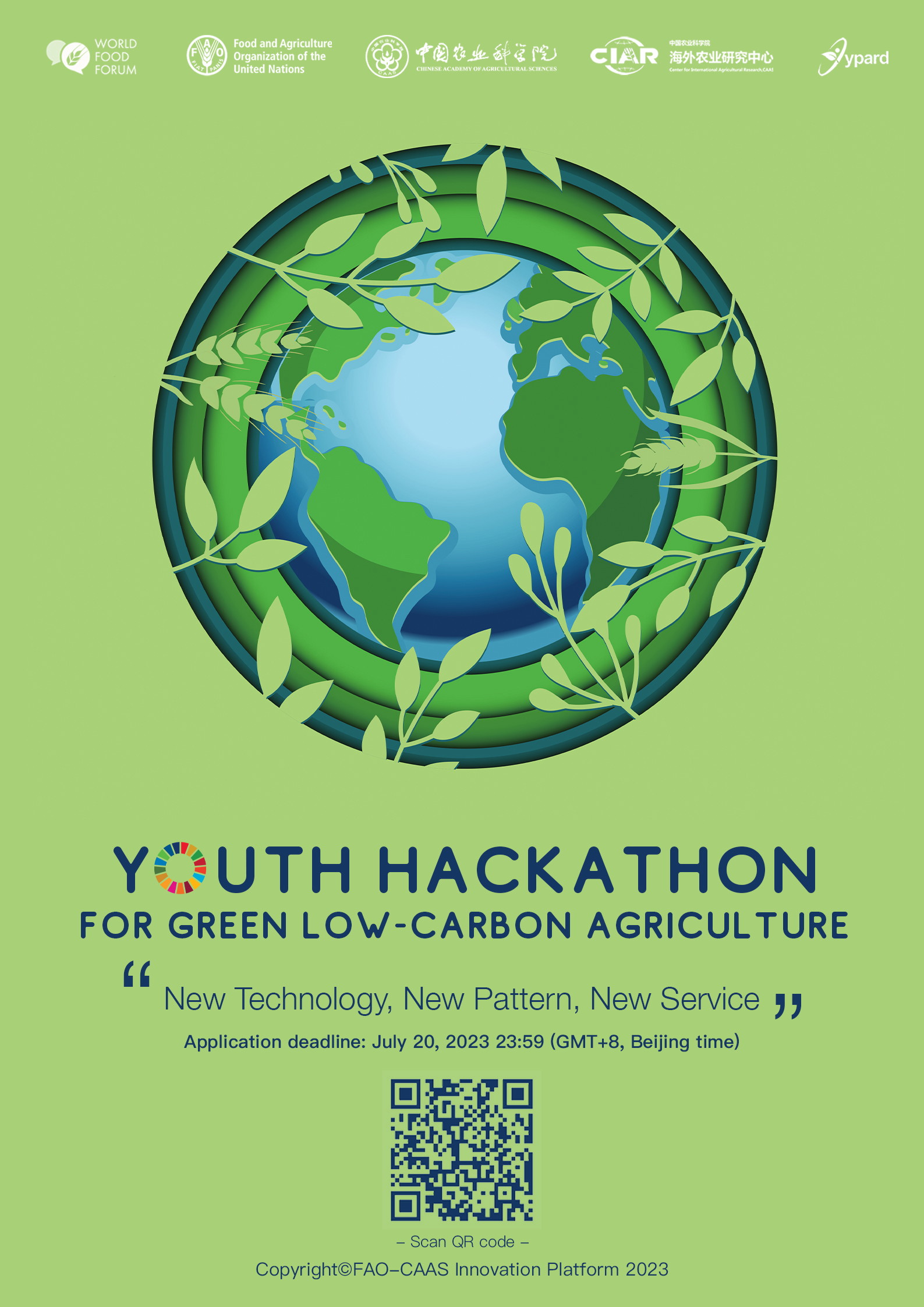The 2023 Youth Hackathon for Green Low-Carbon Agriculture (#YouthforGLCA) aims to bring forth the creativity and problem-solving nature of young people to provide solutions for global agricultural green development, as well as agricultural carbon emissions reduction and carbon sequestration by adopting innovative and inclusive methods with the sense of “New Technology, New Pattern, and New Service.” To promote and advocate sustainable and green agriculture, all young people are encouraged to contribute wisdom and solutions towards a green low-carbon agriculture society, by the given deadline.
This is a joint effort of the Food and Agriculture Organization of the United Nations (FAO) China Office, the Department of International Cooperation of Chinese Academy of Agricultural Sciences (CAAS), the Center for International Agricultural Research of CAAS, and the Young Professionals for Agricultural Development (YPARD). Last year, the 2022 Youth Hackathon for Reducing Food Loss and Waste was organized, and the Hackathon has attracted creative proposals from 21 countries. After three rounds of selection, 15 teams from 8 countries made it to the final.
The 2023 Youth Hackathon places stress on the following three dimensions, namely the “environmental protection technology, green market, and ecological society”, encouraging young people, from 3-tracks of “New Technology, New Pattern, and New Service,” to focus on the potentiality of energy conservation and emission reduction, as well as the decrease of carbon and the enhancement of sink in the whole agricultural value chain of forestation, herding, fishing, and comprehensive third industries.
The 2023 Youth Hackathon is open to all young professionals, team members would ideally be between 18 and 40 years old, of any nationality, with participating economies across the world. Current students may have their mentors as part of the project team. However, the application form must highlight their mentor’s role in the project. Please be noted that all proposals and presentations shall be conducted in English. The Hackathon will be divided into three stages to achieve practical and feasible innovative solutions: preliminary selection, training session, and final competition.
- Preliminary Selection
- Participating teams set their topics, build their teams, and submit all application materials.
- The committee will evaluate the applications and shortlist them in accordance with the theme of “New Technology (Low-Carbon Technology), New Pattern (Green Market), New Service (Ecological Society).”
- Training Session
The organizers will provide training to shortlisted teams, including:
- Public training: recommendations of relevant experts to each team according to the technology/core product involved in the project.
- Customized training: training on PowerPoint preparation and presentation skills to each team so they may conduct presentations more professionally.
- Final Competition
The Final competition will be conducted online and offline due to the epidemic prevention measures. Each team should have a complete and refined presentation and be able to defend their proposal, to participate in the final competition.
(i) Timeline and Key Points
- 10 April – 20 July: Application phase
- 20 July – 20 August: Preliminary selection
- 20 August – Public shortlisting
- 4th Week August – 1st Week September: Training Session (Online)
- 3rd Week of October – Final Competition (Online)
- 4th Week of October – Award Ceremony (Onsite, China)
(ii) Entry Requirements
- Participants will form teams of 2-5 people depending on the needs of their projects.
- The team lead must be below 40 years old.
- Awards are given on a project and team basis. An ideal team should have the following professional background or competencies: (i) Practice/experience related to sustainable agriculture, especially carbon mitigation, (ii) Information technology/software engineering/data engineering, (iii) Project management, and (v) Marketing/New Media Communications.
We encourage teams to be inclusive and create equal opportunities for all, including women, to take key roles in the team. We support interdisciplinary teams to take advantage of their knowledge and skills to offer innovative solutions grounded in practicality.
(iii) Application Materials
Please complete the application as a team, and send the requested materials to ciar@caas.cn (cc to ypardchina@outlook.com) with the title “Submission: 2023 Youth Hackathon Competition” by 20 July 2023, 23:59 (GMT+8, Beijing Time).
- Application form
- Innovative solution for green low-carbon agriculture with materials and templates
- Project proposal in Word format, not exceeding 15 pages, with the main text in Times New Roman, font size 12, double-spaced, and demonstrative pictures, information, guide, and tables.
- PowerPoint presentation based on the above proposal, which should not exceed 20 slides.
- The innovative solution shall cover:
- Summary of the solution (Introduce the team’s ideas and what contributions will they make on reducing food losses and waste? Up to 250 words)
- Problem identification (Analysis of challenges relating to carbon mitigation)
- Vision, Mission, and Values of the program (describing the agricultural and rural activities/sub-fields it targets)
- Elaboration on the program’s impact on carbon reduction in the agricultural and rural sectors (achieving a target of XX tons of carbon reduction or carbon sequestration)
- Societal and economic methodology and technical models (explaining how the target carbon reduction and sequestration is calculated and how it will be achieved)
- Financial situation (capital raising, capital needed, revenue analysis)
- Phased development planning (what is the potential contribution of your project 3 years later? How do you plan to achieve? What are the milestones?)
- Video presentation (5 minutes)
- Introduce your team (1 minute). Name, role in the team, education, experience, and qualities or skills.
- Specify why your team should be selected by presenting the solution chosen by the team, ensuring consistency with the content of the PowerPoint (4-5 minutes).
- Upload the video online to a video-sharing platform (YouTube, Google Cloud, Youku, Baidu Cloud, or other platforms). Please share the link to the video in the application, ensuring it can be downloaded.
(iv) Selection Criteria
The selection committee is composed of experts with various backgrounds, team counselors, and innovation as well as entrepreneurship mentors with experience in reducing food waste and management. Judges are from leading international and national organizations such as the FAO, CAAS, and other partners. The projects and their proposals will be assessed according to the following criteria: (i) Creativity and innovation, (ii) Possibility of landing and scalability, (iii) Sustainability, (iv) Business model, (v) Use of open data, (vi) Technical difficulties, (vii) Design and user experience, and (viii) The effects when applied or demonstrated.
- (v) Awards and benefits for the Participants
- A generous cash prize and a certificate provided by the FAO and CAAS.
- Comprehensive experience of an independent innovation and entrepreneurship activity along with partners who share the same values.
- Networking with other teams, UN agencies, CAAS, and partners in the field for future collaboration.
- Feedback and support from industry experts and mentors and gaining valuable insight and ideas on strategic thinking on sustainable agriculture and carbon mitigation under the new paradigm.
- Inspiring workspace where perspectives from different cultural backgrounds are welcomed.
- Referral to pursuing educational opportunities for graduate or Ph.D. degrees in CAAS, and preferential access to internships within the Center for International Agricultural Research (CIAR).
Deadline: 20 July 2023










